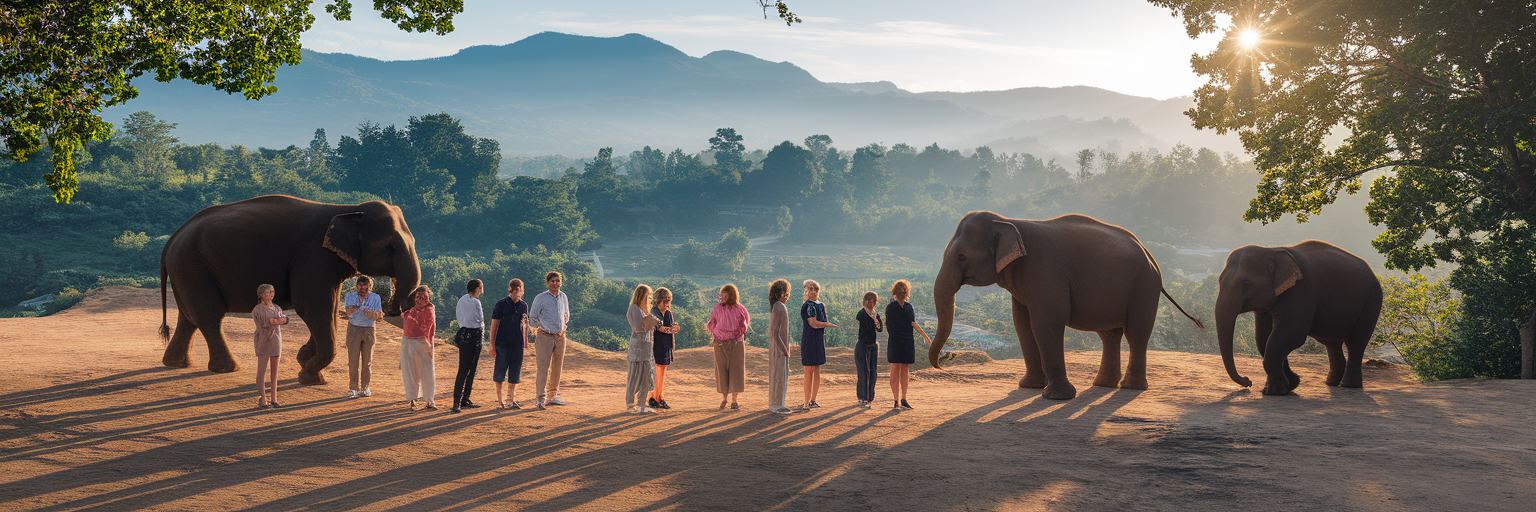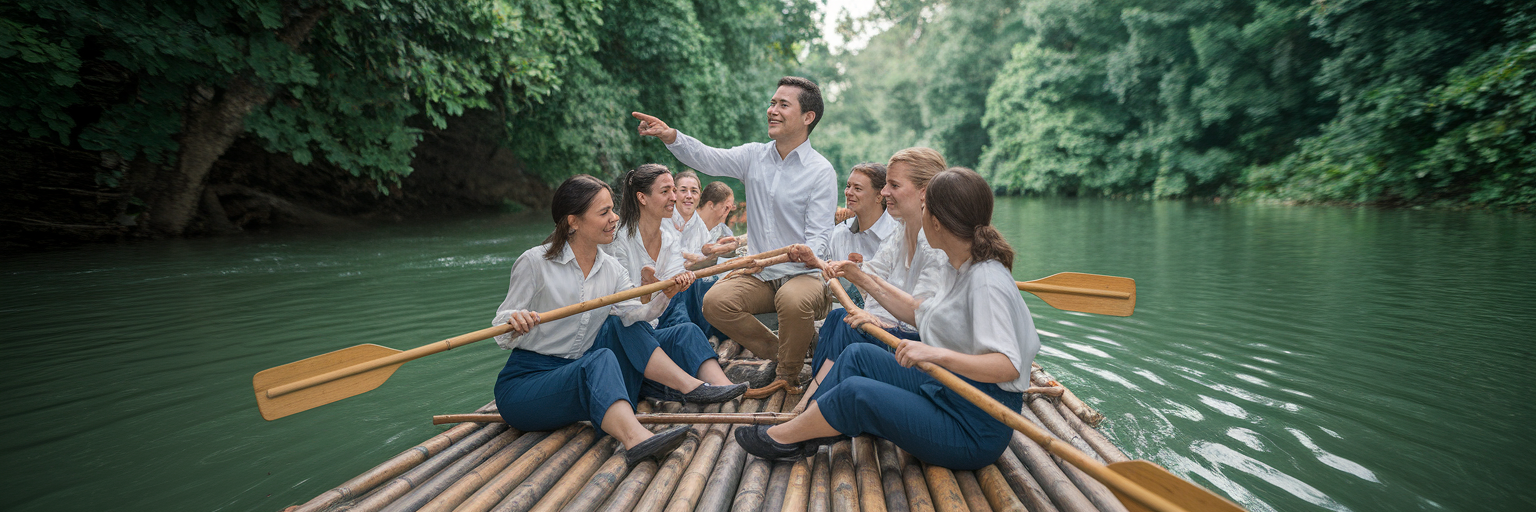Crafting Purposeful Incentive Travel in Chiang Mai
Learn how to design a corporate incentive trip to Northern Thailand that combines team building with meaningful support for eco-tourism and local artisans.

Learn how to design a corporate incentive trip to Northern Thailand that combines team building with meaningful support for eco-tourism and local artisans.

The traditional corporate retreat focused on leisure is giving way to a new model, one where purpose, connection, and positive impact are the ultimate luxuries. This shift is redefining what it means to reward and motivate a team. Companies are discovering that the most memorable trips are not just about relaxation but about shared experiences that align with their values. This is where Northern Thailand, and specifically Chiang Mai, emerges as a strategic destination for forward-thinking organisations.
Chiang Mai is no longer just a scenic backdrop for a holiday. It has become a vibrant hub for purpose-driven corporate experiences. Modern employees and stakeholders expect more than a generic luxury trip. They seek authentic cultural immersion and activities that contribute positively to local communities and the environment. A thoughtfully designed incentive travel Chiang Mai program answers this call, transforming a corporate getaway into a powerful statement of brand values.
This approach delivers tangible business advantages. It enhances brand reputation by demonstrating a commitment to social responsibility. It builds profound employee loyalty by offering experiences that are genuinely meaningful. This strategic approach to corporate gatherings is central to creating impactful programs, and understanding the full scope of our available services is the first step toward designing an unforgettable journey.

One of the most effective ways to build team cohesion is to take people out of the office and into nature. In Chiang Mai, this means engaging in eco-adventures that not only challenge a group but also support vital conservation efforts. These are not just fun outings. They are carefully structured experiences designed to improve communication and problem-solving skills in a dynamic, real-world setting.
Consider a guided trek through the lush trails of Doi Inthanon National Park or bamboo rafting along the gentle currents of the Mae Wang River. Navigating a raft as a team requires synchronised paddling and clear commands, mirroring the collaborative dynamics of a high-performing project team. These eco-tourism team activities are often led by local experts who share their deep knowledge of the region's biodiversity, adding a layer of educational value. As noted in a feature by GLP Films on Thailand's community tourism, ventures around national parks like Doi Inthanon allow teams to experience nature while directly engaging with local culture and life.
To deepen the impact of these adventures, MICE planners can integrate simple yet powerful elements:
This transforms a simple adventure into a memorable lesson in environmental stewardship and teamwork, leaving participants with a shared sense of accomplishment and a greater appreciation for the natural world.
Beyond its natural beauty, Chiang Mai is a city of makers. Its rich artistic heritage offers a unique opportunity for teams to connect with creativity in a hands-on way. Engaging in Chiang Mai artisan workshops is more than a simple craft class. It is a cultural exchange that supports the local economy while nurturing skills directly applicable to the business world, such as patience, attention to detail, and innovative thinking.
Imagine your team learning the delicate art of umbrella painting in Bo Sang or crafting intricate silver jewellery alongside Karen hill tribe artisans. In these moments, participants are not just following instructions. They are absorbing centuries of tradition and learning to see challenges from a new perspective. Chiang Mai's burgeoning craft scene, as highlighted by National Geographic, offers a rich tapestry of experiences that make it an ideal setting for creative team immersion. By participating, companies directly fund the preservation of heritage crafts and support the livelihoods of master artisans.
The tangible souvenir each person creates becomes a powerful symbol of their shared experience and the company's commitment to cultural sustainability. These authentic local experiences in Chiang Mai are part of our wider commitment to delivering exceptional events across Thailand, from the northern hills to the vibrant capital.
| Artisan Workshop | Core Team-Building Skill | Cultural & Economic Impact |
|---|---|---|
| Bo Sang Umbrella Painting | Creativity & Collaborative Design | Supports a historic craft village and preserves a unique Lanna art form. |
| Karen Silver Jewelry Making | Attention to Detail & Patience | Provides direct income to hill tribe artisans, sustaining their traditional silversmithing techniques. |
| Thai Celadon Pottery | Process Orientation & Adaptability | Helps maintain the heritage of wood-ash glazed ceramics, a signature of the region. |
| Natural Fabric Dyeing | Innovation & Sustainability Mindset | Promotes eco-friendly practices and supports local textile producers. |
This table illustrates how specific artisan activities can be aligned with corporate development goals while ensuring a positive and direct impact on Chiang Mai's local communities.

Few things bring people together like sharing a meal. A Northern Thai cooking class offers more than just a delicious lunch. It is a powerful mechanism for breaking down workplace hierarchies and building genuine human connections. The experience begins with a sensory journey, from sourcing vibrant ingredients at a local market to learning the history behind the unique flavours of Lanna cuisine.
In the kitchen, job titles and formal roles disappear. A senior executive might find themselves taking direction from a junior colleague on how to properly crush spices for a curry paste. This shared task encourages informal communication and collaborative problem-solving in a relaxed, enjoyable setting. It is in these unscripted moments that true team bonds are formed. This format for corporate team building Thailand is also highly practical for MICE planners, as classes are easily scalable for large groups and can be customised to accommodate any dietary restrictions.
The experience culminates in everyone sitting down to enjoy the meal they prepared together. This shared feast is not just food. It is the delicious result of their collective effort, creating a powerful and lasting memory of teamwork and connection. The principles of creating such an emotionally resonant experience are universal, as the goal is always to forge a genuine connection.
How do you ensure an incentive trip is genuinely beneficial and not just another form of superficial tourism? This is a critical question for any company serious about its social impact. The key lies in partnering with organisations that facilitate authentic community engagement, not staged performances for tourists. It is about choosing experiences where the cultural exchange is real and the economic benefits are shared equitably.
The model of community-based tourism provides a clear path forward. Initiatives like the Chai Lai Orchid, which focuses on ethical, community-based tourism, demonstrate a model where visitors contribute directly to local empowerment and social transformation. These programs empower local families to own and manage tourism activities on their own terms. This ensures that revenue stays within the community and that the cultural interactions are respectful and authentic.
When vetting potential partners for your incentive program, it is important to ask the right questions. This demonstrates a commitment to ethical practices and helps you make informed decisions. Consider these criteria:
A purpose-driven incentive trip to Chiang Mai delivers a return on investment that goes far beyond a simple vacation. By integrating eco-adventures, artisan workshops, and community engagement, companies can boost employee morale, forge deep team connections, and enhance loyalty in a way that a standard luxury trip cannot. These experiences create a powerful sense of shared purpose that translates directly back to the workplace.
Furthermore, this approach aligns perfectly with corporate ESG (Environmental, Social, and Governance) objectives. It provides a powerful source of storytelling for the brand, generating authentic content that can be shared with stakeholders, customers, and future talent. This commitment to responsible travel is a defining feature of successful sustainable MICE events Asia. An incentive trip should not be viewed as an expense but as a strategic investment in your people and your brand's legacy.
A well-designed program in Chiang Mai leaves a positive mark on both the team and the destination itself. Transforming these ideas into a seamless and impactful incentive program is where true partnership begins. If you are ready to create an experience with a lasting legacy, we are ready to work with you.